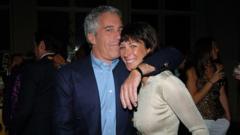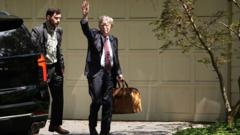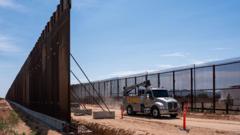In recent weeks, Australia has found itself at the intersection of local politics and global uncertainties, driven by the unpredictable nature of US President Donald Trump's trade policies. The country gears up for its federal election on May 3, and the impending contest has become as turbulent as a rodeo, with politicians navigating through the tumultuous waters of international relations that Trump has affected.
Trump's Shadow Cast Over Australia's Electoral Landscape

Trump's Shadow Cast Over Australia's Electoral Landscape
As Australians prepare for their federal election, the influence of Donald Trump's trade policies looms large, reshaping the political discourse.
In Western Sydney, amid the cheers and exuberance of a local rodeo, residents express their mixed sentiments about international affairs. "Tariffs are great," declares devoted cowboy fan Guy Algozzino, reflecting a sentiment shared by some who believe in stronger trade protections, despite the discomfort that comes with Trump’s unpredictable measures. While others like Jared Harris observe global politics as an entertainment spectacle, unaware of its actual impact on their lives.
Australia's leaders, especially Prime Minister Anthony Albanese, have found themselves grappling with the implications of Trump's policies that disrupt long-standing alliances. After Trump’s initial announcement of tariffs without exemptions, Albanese remarked that such actions were "not the act of a friend," emphasizing the discomfort within Australia regarding its ties to the US.
The upcoming election has shifted focus from domestic issues like cost-of-living and healthcare to the US relationship, albeit unintendedly. With the Labor Party's Albanese gaining momentum in polls against the Coalition, many attribute this shift partly to the backdrop of instability brought on by Trump. Political analyst Amy Remeikis notes, "The looming figure of Trump is overshadowing the domestic campaign," prompting a deep reconsideration of Australia's foreign alliances.
Recent dialogues in political arenas highlight a new reality for Australian voters — navigating a world that feels increasingly uncertain. This election, marked by rising concerns over China and shifting political alliances, is steering candidates to confront questions about how to best approach a potentially hostile American administration. While Dutton, the opposition leader, initially positioned himself close to Trump, he is now treading carefully, reflective of his party's need to respond to changing public sentiments.
Polls show growing skepticism about Trump, with a significant portion of the Australian populace believing his presence is detrimental to their country, and many stressing that collaboration with the US at this time remains necessary despite the rising tensions. “We don’t have anywhere else to turn,” states David Andrews, reinforcing the sentiment that Australia’s isolation dictates a firm reliance on US alliances, even in the face of erratic policies from Washington.
As voters prepare for the election, the rodeo festivities serve as a fitting metaphor for the current political climate — a mix of excitement and trepidation, mirroring the unpredictable nature of Trump’s influence over politics that many had once presumed stable. The question now remains: who will best navigate this tumultuous terrain as Australians seek a leader capable of maintaining steady hands in changing tides.
Australia's leaders, especially Prime Minister Anthony Albanese, have found themselves grappling with the implications of Trump's policies that disrupt long-standing alliances. After Trump’s initial announcement of tariffs without exemptions, Albanese remarked that such actions were "not the act of a friend," emphasizing the discomfort within Australia regarding its ties to the US.
The upcoming election has shifted focus from domestic issues like cost-of-living and healthcare to the US relationship, albeit unintendedly. With the Labor Party's Albanese gaining momentum in polls against the Coalition, many attribute this shift partly to the backdrop of instability brought on by Trump. Political analyst Amy Remeikis notes, "The looming figure of Trump is overshadowing the domestic campaign," prompting a deep reconsideration of Australia's foreign alliances.
Recent dialogues in political arenas highlight a new reality for Australian voters — navigating a world that feels increasingly uncertain. This election, marked by rising concerns over China and shifting political alliances, is steering candidates to confront questions about how to best approach a potentially hostile American administration. While Dutton, the opposition leader, initially positioned himself close to Trump, he is now treading carefully, reflective of his party's need to respond to changing public sentiments.
Polls show growing skepticism about Trump, with a significant portion of the Australian populace believing his presence is detrimental to their country, and many stressing that collaboration with the US at this time remains necessary despite the rising tensions. “We don’t have anywhere else to turn,” states David Andrews, reinforcing the sentiment that Australia’s isolation dictates a firm reliance on US alliances, even in the face of erratic policies from Washington.
As voters prepare for the election, the rodeo festivities serve as a fitting metaphor for the current political climate — a mix of excitement and trepidation, mirroring the unpredictable nature of Trump’s influence over politics that many had once presumed stable. The question now remains: who will best navigate this tumultuous terrain as Australians seek a leader capable of maintaining steady hands in changing tides.



















